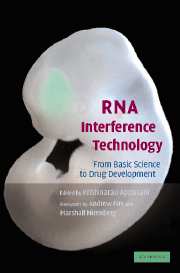Book contents
- Frontmatter
- Contents
- Foreword by Andrew Fire
- Foreword by Marshall Nirenberg
- List of Contributors
- Introduction
- Section one Basic RNAi, siRNA, microRNAs and gene-silencing mechanisms
- Section two Design, synthesis of siRNAs
- Section three Vector development and in vivo, in vitro and in ovo delivery methods
- Section four Gene silencing in model organisms
- Section five Drug target validation
- Section six Therapeutic and drug development
- Section seven High-throughput genome-wide RNAi analysis
- 30 High-throughput RNAi by soaking in Caenorhabtis elegans
- 31 Tools for integrative genomics: Genome-wide RNAi and expression profiling in Drosophila
- 32 Microarray analysis and RNA silencing to determine genes functionally important in mesothelioma
- 33 High-throughput RNA interference
- 34 Generation of highly specific vector-based shRNAi libraries directed against the entire human genome
- Index
- Plate section
- References
34 - Generation of highly specific vector-based shRNAi libraries directed against the entire human genome
Published online by Cambridge University Press: 31 July 2009
- Frontmatter
- Contents
- Foreword by Andrew Fire
- Foreword by Marshall Nirenberg
- List of Contributors
- Introduction
- Section one Basic RNAi, siRNA, microRNAs and gene-silencing mechanisms
- Section two Design, synthesis of siRNAs
- Section three Vector development and in vivo, in vitro and in ovo delivery methods
- Section four Gene silencing in model organisms
- Section five Drug target validation
- Section six Therapeutic and drug development
- Section seven High-throughput genome-wide RNAi analysis
- 30 High-throughput RNAi by soaking in Caenorhabtis elegans
- 31 Tools for integrative genomics: Genome-wide RNAi and expression profiling in Drosophila
- 32 Microarray analysis and RNA silencing to determine genes functionally important in mesothelioma
- 33 High-throughput RNA interference
- 34 Generation of highly specific vector-based shRNAi libraries directed against the entire human genome
- Index
- Plate section
- References
Summary
Introduction
The success of the Human Genome Project and the availability of the complete sequence of the human genome have revealed the existence of numerous genes whose functions are unknown. Although many functional genes were successfully identified using libraries of randomized ribozymes (Kruger et al., 2000; Li et al., 2000; Welch et al., 2000; Beger et al., 2001; Kawasaki et al., 2002; Kawasaki and Taira, 2002; Onuki et al., 2002; Nelson et al., 2003; Rhoades and Wong-Staal, 2003; Suyama et al., 2003a, b; Chatterton et al., 2004; Kuwabara et al., 2004; Onuki et al., 2004), the randomized library naturally contained many ribozymes that could not hybridize with any human gene transcripts, resulting in some false positives. While exploitation of RNA interference (RNAi) is hampered by the induction of the interferon response upon the introduction of double-stranded RNA (dsRNA) into mammalian cells (Elbashir et al., 2001), RNAi can be a powerful tool in gene analysis and, for example, the functions of a number of genes in the nematode Caenorhabditis elegans have been identified as being associated with particular mutant phenotypes (Fraser et al., 2000; Gonczy et al., 2000). Recent progress in mammalian cells, as discussed in this chapter, suggests that it should soon be possible to extend genome-wide approaches to mammalian cells, using libraries of small interfering RNA (siRNA) oligonucleotides or siRNA-expression libraries.
Efforts to exploit the phenomenon of RNA interference (RNAi) in mammalian cells have been hampered by the interferon response in cells into which foreign RNA is introduced.
Information
- Type
- Chapter
- Information
- RNA Interference TechnologyFrom Basic Science to Drug Development, pp. 480 - 496Publisher: Cambridge University PressPrint publication year: 2005
References
Accessibility standard: Unknown
Why this information is here
This section outlines the accessibility features of this content - including support for screen readers, full keyboard navigation and high-contrast display options. This may not be relevant for you.Accessibility Information
- 1
- Cited by
